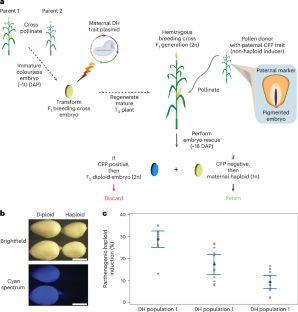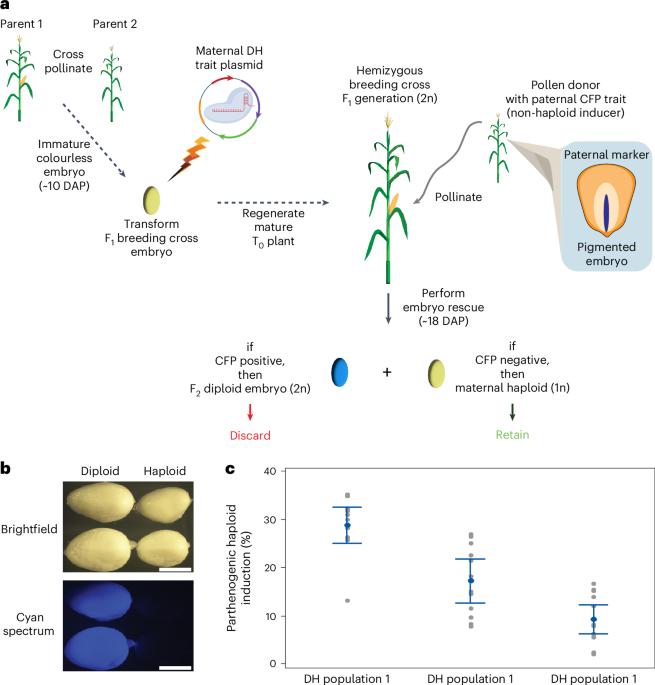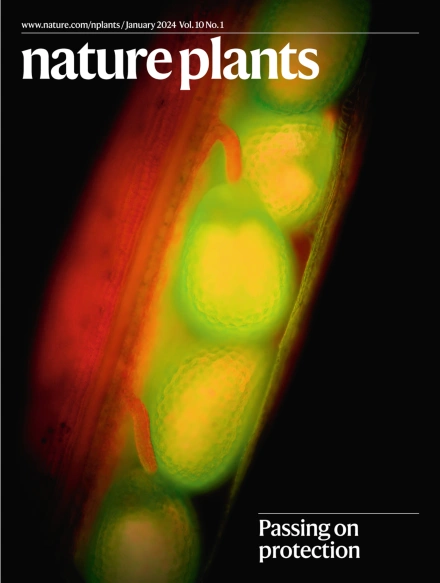A novel in vivo genome editing doubled haploid system for Zea mays L.
IF 15.8
1区 生物学
Q1 PLANT SCIENCES
引用次数: 0
Abstract
Doubled haploid (DH) technologies accelerate maize inbred development. Recently, methods using CRISPR–Cas have created gene-edited maize DH populations, albeit with relatively low editing frequencies. Restoring fertility via haploid chromosome doubling remains a critically important production constraint. Thus, improved editing and chromosome doubling outcomes are needed. Here we obtained maternally derived diploid embryos in vivo by ectopically co-expressing Zea mays BABY BOOM and cyclin D-like gene products within unfertilized egg cells. When combined with gene editing, the in vivo method enables the production of mature seed with a maternally derived, gene-edited diploid embryo without requiring in vitro tissue culture methods nor the use of a chemical chromosome doubling agent. In summary, we report a novel approach for creating gene-edited maize DH populations that we expect can accelerate genetic gain in a scalable, cost-effective manner. Ye et al. use a novel genetic haploid genome doubling method with parthenogenesis and gene editing to produce edited, maternally derived di-haploid progeny. A truncated BABY BOOM peptide confers both parthenogenesis and haploid genome doubling.


用于玉米的新型体内基因组编辑加倍单倍体系统
双单倍体(DH)技术加速了玉米近交系的发展。最近,使用 CRISPR-Cas 的方法创建了基因编辑的玉米 DH 群体,尽管编辑频率相对较低。通过单倍体染色体加倍恢复育性仍然是一个极其重要的生产制约因素。因此,需要改进编辑和染色体加倍的结果。在这里,我们通过在未受精卵细胞内异位共表达玉米 BABY BOOM 和细胞周期蛋白 D 样基因产物,获得了母本衍生的体内二倍体胚胎。这种体内方法与基因编辑技术相结合,就能生产出带有经基因编辑的母源二倍体胚胎的成熟种子,而无需体外组织培养方法,也无需使用化学染色体加倍剂。总之,我们报告了一种创建基因编辑玉米 DH 群体的新方法,我们希望这种方法能以一种可扩展的、具有成本效益的方式加速遗传增益。
本文章由计算机程序翻译,如有差异,请以英文原文为准。
求助全文
约1分钟内获得全文
求助全文
来源期刊

Nature Plants
PLANT SCIENCES-
CiteScore
25.30
自引率
2.20%
发文量
196
期刊介绍:
Nature Plants is an online-only, monthly journal publishing the best research on plants — from their evolution, development, metabolism and environmental interactions to their societal significance.
 求助内容:
求助内容: 应助结果提醒方式:
应助结果提醒方式:


